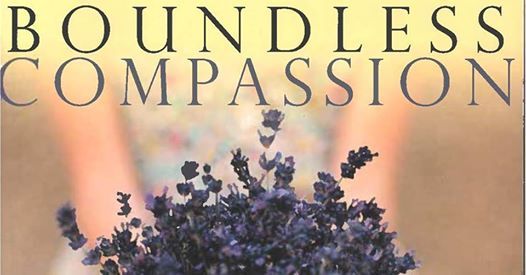Scripture for Sunday: Mark 1:35-37
35 In the morning, while it was still very dark, he got up and went out to a deserted place, and there he prayed. 36 And Simon and his companions hunted for him. 37 When they found him, they said to him, “Everyone is searching for you.”
Notes on the Text:
We continue this week our journey with Jesus to Jerusalem along the path of compassion. We are looking at his example of compassion for his own soul. We often focus on Jesus’ actions or words of compassion for others, yet the Gospels also mention several times how Jesus got away from the crowds to be by himself and to pray. In this week’s Bible story, we hear about Jesus taking such time.
The Gospel of Mark is known for its brevity. It is the shortest Gospel and is often known for the word “immediately” which is used 42 times in this brief book. Yet, even as Mark tried to keep the story of Jesus short and focused, he took the time to mention several episodes of Jesus getting away for rest or for prayer. The Gospel writer saw that it was an important part of the story of the ministry of Jesus. Jesus had a lot of people looking for him. He had incredible gifts for teaching, preaching, healing, and changing the world. He could have fallen into the illusion of compassion being limited to the outside world and to helping others. But Jesus knew better. He had a long preparation for public ministry. He was steeped in the prayer traditions of his religion. Sabbath keeping was not something to be taken lightly in the Jewish tradition. Prayer time and rest were essential parts of one’s life because the soul and the spiritual life were not seen as commodities to help one live a good life. Instead, the Jewish people saw them as the very goal of life. A vital inner life was at the heart of one’s success in life. That does not mean that everyone in the time of Jesus really got it because people back then had problems just the same way we do today. The disciples struggled with Jesus’ taking time to pray or to sleep. They wanted him to always be on the go. When he was asleep in the boat and they faced a storm, they woke him up and demanded action. In our story for this week, they “hunted for him.” They knew his practices of prayer and his need to be away from others. Yet, they fell under the spell of needing to have him act and to have compassion for others without the balance of compassion for himself.
Jesus’ inner life was the source of what he did in his public ministry. He did not see his prayer life as a separate part of his life. An active prayer life was at the heart of what he did.
For Reflection:
This week, I dare you to follow in the footsteps of Jesus of becoming more aware of your soul. Compassion begins in our souls and if we are to live compassionate lives, we must have a deep awareness of our souls. In her book Boundless Compassion, Joyce Rupp asks this powerful question, “When is the last time you fully welcomed yourself into your own heart?” She goes on to say, “Self-compassion implies giving ourselves a worthy share of attentive care.” Then she quotes Christina Feldman, “Exploring your inner world, the relationships you form with all that arises in your body, heart, and mind you discover a microscopic view of the relationship you form with all of life. Within this inner world, you sow the seeds of the compassionate heart or the alienated heart…The training ground of boundless compassion is in all the small moments in which you meet the painful and difficult within your own life that you are prone to deny or reject.”
Our awareness of our souls is so essential for our capacity for compassion in the world. Part of the challenge is that it takes time and a lot of letting go. I love the teachings of Parker Palmer about the soul. In his book Hidden Wholeness, Palmer writes that “The soul is like a wild animal—tough, resilient, savvy, self-sufficient and yet exceedingly shy. If we want to see a wild animal, the last thing we should do is to go crashing through the woods, shouting for the creature to come out. But if we are willing to walk quietly into the woods and sit silently for an hour or two at the base of a tree, the creature we are waiting for may well emerge, and out of the corner of an eye we will catch a glimpse of the precious wildness we seek.”
In his book Care for the Soul, Thomas Moore writes that the, “Soul is not a thing, but a quality or dimension of experiencing life and ourselves. It has to do with depth, value, relatedness, heart, and personal substance. I do not use the word here as an object of religious belief or as something to do with immortality…Care of the soul begins with observance of how the soul manifests itself and how it operates. We can’t care for the soul unless we are familiar with its ways. Observance is a word from ritual and religion. It means to watch out for, but also to honor and keep, as in the observance of a holiday. The serv in observance originally referred to tending sheep. Observing the soul, we keep an eye on its sheep, on whatever is wandering and grazing—the latest addiction, a striking dream, or a troubling mood.”
In continuing to use Joyce Rupp’s image of the “Tree of Compassion,” I would like you to consider what helps you grow in your awareness of your soul. Reflect on the roots as an apt metaphor for the soul. They are invisible yet so important and essential for the life of the tree. They are the source of life for trees, just like the soul is the source of life for our compassion.
Here is a beautiful poem by Mary Oliver about the soul.
Some Questions You Might Ask
Is the soul solid, like iron?
Or is it tender and breakable, like
the wings of a moth in the beak of an owl?
Who has it, and who doesn’t?
I keep looking around me.
The face of the moose is as sad as the face of Jesus.
The swan opens her white wings slowly
In the fall, the black bear carries leaves into the darkness. One question leads to another.
Does it have a shape? Like an iceberg?
Like the eye of a hummingbird?
Does it have one lung, like the snake and the scallop?
Why should I have it, and not the anteater
who loves her children?
Why should I have it, and not the camel?
Come to think of it, what about the maple trees?
What about the blue iris?
What about all the little stones, sitting alone in the moonlight?
What about roses, and lemons, and their shining leaves?
What about the grass?
Prayer Blessing by John O’Donohue:
May you recognize in your life the presence, power, and light of your soul. May you realize that you are never alone, that your soul in its brightness and belonging connects you intimately with the rhythm of the universe. May you have respect for your individuality and difference. May you realize that the shape of your soul is unique, that you have a special destiny here, that behind the façade of your life there is something beautiful and eternal happening. May you learn to see yourself with the same delight, pride, and expectation with which God sees you in every moment. Amen.


